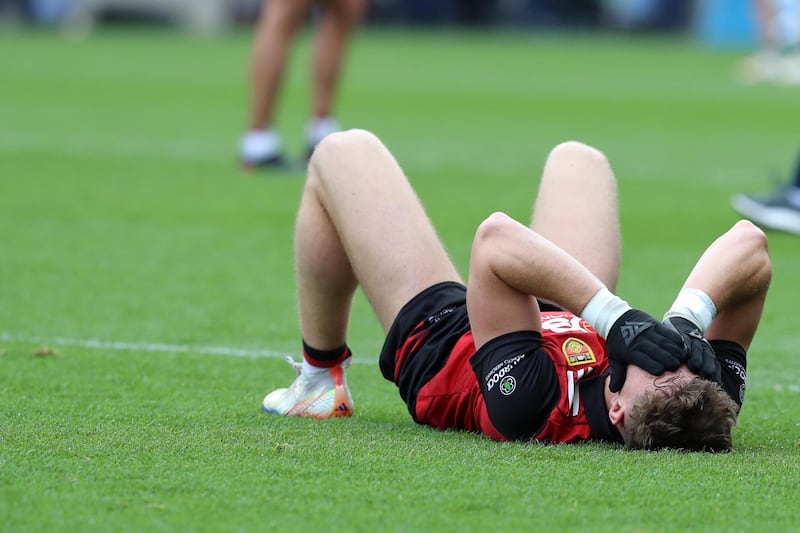Allianz Football League Division Two final: Derry v Dublin (Sunday, 1.45pm, Croke Park, live on TG4)
IF a team is what it repeatedly does, then Dublin are actually the team we saw in the second half in Celtic Park and not the team of the first half.
How much of that is plodding along, not needing to do any more to get out of Division Two or Leinster? How much of a difference do Jack McCaffrey and Paul Mannion make when they’re both up to speed? Valid questions that will only be answered later on in the year.
But the crumbs being left by Dessie Farrell’s team in this league campaign won’t lead them to an All-Ireland.
Under Jim Gavin, Dublin had transformed themselves from the masters of attacking football into the masters of structured attack. They led football through the dark ages by learning how to play through massed defences.
Other coaches came to recognise the width and depth of their attacking shape and began to copy it. Hence the trend of scoring averages continuing to rise while nothing much changes about the way teams set up defensively. That is all on Dublin.
The current team are really struggling when it comes to structured attacking.
There are two key pieces of evidence. They aren’t working scores in around the ‘D’, and they aren’t scoring goals.
When Louth got a chance to set up defensively last Sunday, they were rock solid. Dublin couldn’t break them down, at all. They ran into tackles, kicked into blocks, hoofed ball up into the sky.
But when Louth committed bodies forward and made mistakes, threw tired passes under pressure, they were punished almost every single time. Same with Clare, same with Kildare.
Almost all of their best work this year has been done when they can force turnovers. More than any other team in Ireland, Kerry included, they look to go at break-neck speed.
They should have won in Celtic Park for that reason. Derry stayed in the game in the first half partly because they kicked so many wides. A strange statement, you might say, but they got their shots away and they got the ball dead. Dublin didn’t get to take it off them and go at the space.
When Brendan Rogers lost the ball to Niall Scully on the Dublin 45 with six minutes to play, we got the best reminder of what they’re capable of.
The visitors led by a point. They broke in huge numbers and worked the ball eventually to Ciaran Kilkenny. Had he squared it to Cormac Costello to palm into an empty net, the game was over. Kilkenny fisted the point instead.
A little bit of the goalscoring instinct has left them.
Across Farrell’s 20 Croke Park games in charge, they’ve scored 24 goals and failed to hit the net six times. Across three home games this year - against Kildare, Clare and Louth, not exactly frightening opposition - they’ve scored just one goal.
When they stole a James Califf kickout 30 yards from goal at one stage last weekend, Dublin had five runners ready to walk the ball into the net. Con O’Callaghan threw a loose pass and let Louth off the hook.
In the past they could get away with that. The great Jim Gavin team wasn’t always the most efficient when they saw the white of the ‘keeper’s eyes, but they didn’t always have to be. They were hitting 20 points a game on bad days.
Dublin’s first half in Celtic Park appeared outstanding. They were all back-door cuts and energy and aggression. Every Derry run was tracked religiously.
But by full-time you were questioning it all again. Derry had stood off them in the first half, been far too deep and too passive. When they stepped up after half-time, the Ulster champions came back from six down to win.
It bodes well for them. To say they had the best defensive record in the four divisions of the league doesn’t do it justice. They conceded 69 points (3-60) in seven games.
Derry’s defensive record was at least 24 per cent better than every other team in Ireland with the exception of Westmeath.
Ordinarily, Rory Gallagher’s team don’t make mistakes in possession.
But you must look to the one big exception there too, because when it comes to Sunday afternoon, it is on that exception Derry will be judged.
Galway sealed off the middle of their goal in last summer’s All-Ireland semi-final. Aware that Derry tend not to shoot from outside the ‘D’, Padraic Joyce set his side up to cut off that area at all costs.
At times their defenders backed off Derry players who were 30 metres from goal, knowing they wouldn’t shoot. The plan worked. Derry never got inside, only created two half-goal chances and scored just 1-6.
The big question mark that hangs over them as All-Ireland contenders is whether they can hurt the better teams in Croke Park. Galway was their only test against a top-end side on the big field.
What they have become is a team that minimises mistakes.
In a game of chess, a game of structured attacks, you can only make Derry favourites.
That says a lot about both teams.







